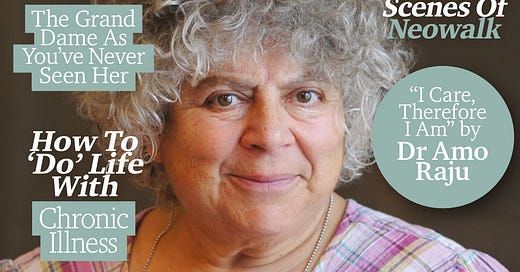‘Be careful what you wish for’ is a maxim that ought, perhaps, to be tattooed across my eyelids - just so that this reminder can be seen as I drift off to sleep each night, a reprimand as a last thought for each waking day.
I edit/edited Disability Review Magazine. I wanted to revamp the concept of disability a bit - in using the social model - and bringing in the elements of the fun and frippery with more serious matters alongside: who better to interview for the cover than Miriam Margolyes?
I have always loved magazines, ever since I was given a Disney comic at the age of about 4; I remember being devastated, somewhat irrationally, when a parent cut it up to be collage material. I interviewed a few of the editors whose magazines I read while a student; there was
at Glamour Magazine, Victoria White at Company Magazine, others. The features editor of Company Magazine, now at Elle, cemented this when she invited me to the Broadwick Street offices. That was intoxicating. Elvin was the age I am now when she edited her first magazine. It was not something I expected to be doing, at all. I still have a handwritten note from her when I wrote a letter to her office for advice. But I digress.One of the lessons I had learned was to have a ‘memorable’ cover star to set a tone, and to generate interest, at the very least. Most covers today are not memorable in this sense, bar occasionally Vogue. Miriam Margolyes earned an icon status with my generation thanks to her cover with Vogue; Disability Review Magazine has an age appropriate audience. What could possibly go wrong? Just don’t mention Harry Potter…
Note: some of the language from here may be offensive to some.
A few false starts - due to confusion over dates and time zones - and the Monday morning was off to a (high octane) start. COVID STALKS THE LAND was the text message bidding me a good week, in warning me to mask up. That I cackled at - but the white knuckles of anxiety began.
I’d interviewed the former editor of the Guardian at his home before, which was organised in about 4 days; this was a 24 hour set up and go, which was unnerving. (This was Alan Rusbridger for the NUJ’s magazine - another story of when *everything* went wrong, for another time.) Preparation can be executed to any degree you want - but conversations need a ‘flow’. It’s not something I am entirely good at, thanks to having to script a lot - not many people realise that. Brain fog thanks to Covid 19 means I often get talked over - but then again, disabled women are not given platforms in cultural discourse. (Discuss in your essay for 15 marks!)
Keep reading with a 7-day free trial
Subscribe to The Disabled Feminist to keep reading this post and get 7 days of free access to the full post archives.




